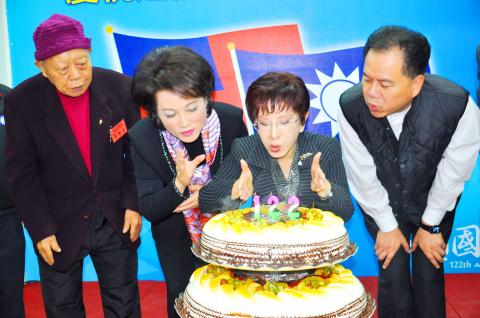Chinese Nationalist Party (KMT) Chairwoman Hung Hsiu-chu (洪秀柱) yesterday accused the Democratic Progressive Party (DPP) government of seeking to launch a politically motivated witch hunt under the banner of “transitional justice.”
Hung said only the KMT has managed to achieve actual transitional justice.
“The KMT has cultivated Taiwan for more than 60 years, making the nation one of the four Asian tiger economies and also, through former president Chiang Ching-kuo’s (蔣經國) lifting of bans on newspapers and political parties, transformed the Republic of China [ROC] from authoritarianism to democracy,” Hung said.

Photo: Wang Shan-yan, Taipei Times
“This is what we call genuine transitional justice,” Hung said, adding that the DPP administration’s oft-trumpeted efforts to push for transitional justice are nothing but a sugarcoated political witch hunt.
Hung made the remarks on the sidelines of an event held by the party’s Chiayi County chapter yesterday morning to celebrate the 122th anniversary of the founding of the KMT’s predecessor the Revive China Society.
The event came two days after the Executive Yuan’s Ill-gotten Party Assets Settlement Committee ordered the KMT to transfer to the government all its rights to shares issued by Central Investment Co (中央投資公司) and Hsinyutai Co (欣裕台), after concluding that the two companies were founded using illegally obtained assets.
Hung said since the KMT failed to do a good job in some aspects and given the public’s yearning for a new government that could bring hope and new prospects, it was natural for the party to be voted out of office under a democratic system.
“But what has the DPP government done since taking office? The first thing it did was launch a witch hunt against the KMT in the hopes of eliminating the party and realizing its goal of political hegemony,” Hung said.
At a separate celebratory event in Chiayi, Hung said that the KMT has already dealt with its problematic properties after former president Chen Shui-bian (陳水扁) of the DPP conducted a sweeping investigation into the party’s assets during his eight-year presidency.
“The DPP has forced the Act Governing the Handling of Ill-gotten Properties by Political Parties and Their Affiliate Organizations (政黨及其附隨組織不當取得財產處理條例) through the legislature, but has denied the KMT the right to file a list of its assets within a year in accordance with the act,” Hung said.
“Only bandits would unilaterally seize all of someone’s assets,” Hung added.

The manufacture of the remaining 28 M1A2T Abrams tanks Taiwan purchased from the US has recently been completed, and they are expected to be delivered within the next one to two months, a source said yesterday. The Ministry of National Defense is arranging cargo ships to transport the tanks to Taiwan as soon as possible, said the source, who is familiar with the matter. The estimated arrival time ranges from late this month to early next month, the source said. The 28 Abrams tanks make up the third and final batch of a total of 108 tanks, valued at about NT$40.5 billion

Two Taiwanese prosecutors were questioned by Chinese security personnel at their hotel during a trip to China’s Henan Province this month, the Mainland Affairs Council (MAC) said yesterday. The officers had personal information on the prosecutors, including “when they were assigned to their posts, their work locations and job titles,” MAC Deputy Minister and spokesman Liang Wen-chieh (梁文傑) said. On top of asking about their agencies and positions, the officers also questioned the prosecutors about the Cross-Strait Joint Crime-Fighting and Judicial Mutual Assistance Agreement, a pact that serves as the framework for Taiwan-China cooperation on combating crime and providing judicial assistance, Liang

A group from the Taiwanese Designers in Australia association yesterday represented Taiwan at the Midsumma Pride March in Melbourne. The march, held in the St. Kilda suburb, is the city’s largest LGBTQIA+ parade and the flagship event of the annual Midsumma Festival. It attracted more than 45,000 spectators who supported the 400 groups and 10,000 marchers that participated this year, the association said. Taiwanese Designers said they organized a team to march for Taiwan this year, joining politicians, government agencies, professionals and community organizations in showing support for LGBTQIA+ people and diverse communities. As the first country in Asia to legalize same-sex

MOTIVES QUESTIONED The PLA considers Xi’s policies toward Taiwan to be driven by personal considerations rather than military assessment, the Epoch Times reports Chinese President Xi Jinping’s (習近平) latest purge of the Chinese People’s Liberation Army (PLA) leadership might have been prompted by the military’s opposition to plans of invading Taiwan, the Epoch Times said. The Chinese military opposes waging war against Taiwan by a large consensus, putting it at odds with Xi’s vision, the Falun Gong-affiliated daily said in a report on Thursday, citing anonymous sources with insight into the PLA’s inner workings. The opposition is not the opinion of a few generals, but a widely shared view among the PLA cadre, the Epoch Times cited them as saying. “Chinese forces know full well that